A Major Party with Major (Fixable) Problems
This is an EXCERPT ONLY from the original published on Project Minnesota HERE:
https://www.projectminnesota.com/a-major-party-with-major-fixable-problems/
This post is TOO LONG for email. To read all 36 points and 9 sets of questions in full, go HERE.
In coming days, an audio version of this post will be published.
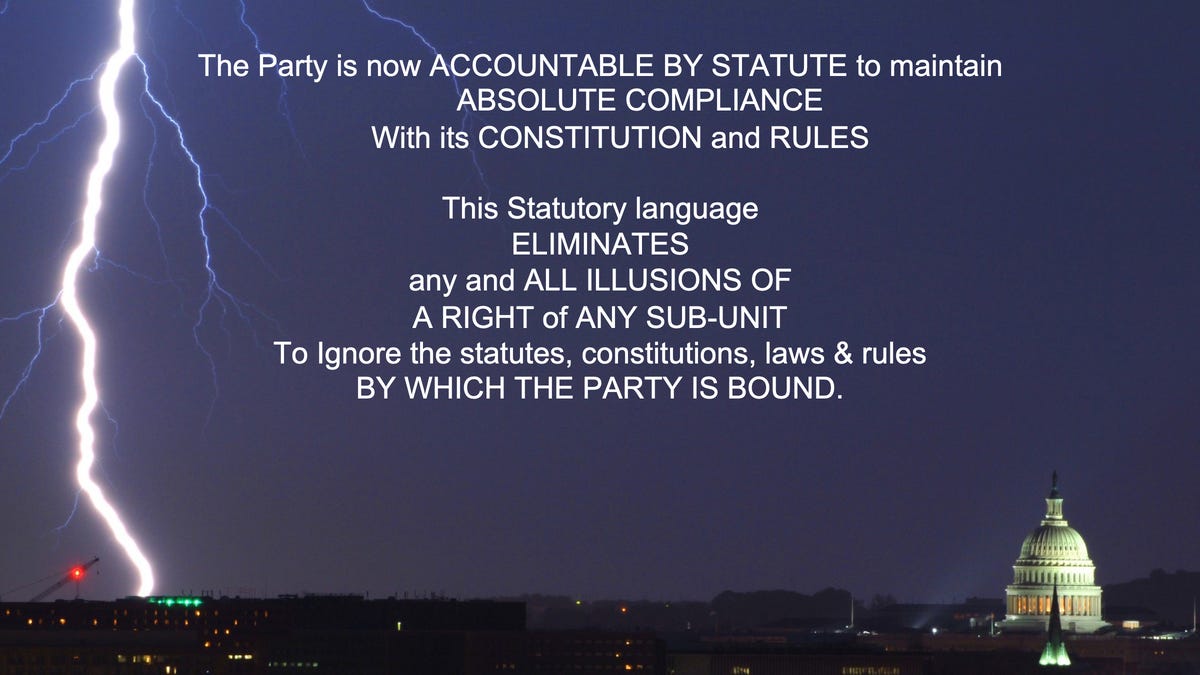
Written while listening to 369 Hz Nikola Tesla Frequency
What follows are 36 points, with 9 sets of questions.
Summary:
Precinct caucuses are the foundation and first in a series of elections from the perspective of which candidates end up on the ballot for major political parties in Minnesota. Precinct delegates are elected permanently according to Minnesota Statute 202A.18. But what happens if that process is corrupted such that a party is out of compliance with its own constitution and rules by, for just one example, disenfranchising duly elected delegates?
Moreover, what if, in fact, that party’s last properly adopted and filed constitution is from 1988? And what if, in fact, the same party’s 2022 constitution was not properly adopted (amendments merely adopted as a bloc)? Finally, what if, in fact, the current party Chair submitted documents to the Minnesota Office of the Secretary of State in such a way as to it appears perjure himself relating to the not-yet adopted constitution?
Failing to remedy the situation, if newly passed legislation, an amended 200.02 Subd. 7. by Minnesota’s 93rd Legislature is enforced, the Minnesota Republican Party after December 1, 2023 could well lose major party status, along with large consequences such as forfeiting the precinct caucus model and election judges to safeguard our sacred voice in politics as represented by our votes.
From here, there is a path to reclaiming the party for the people so that it not only comes into compliance with its own not-yet adopted constitution and rules but also with the new reasonable legislation which says major political parties must be in compliance to that end, and also must certify that they are.
This three-step path will lead to significant change in Minnesota politics:
- Starting with a state central delegate meeting and followed by a state convention, the Republican Party gets back into compliance with the reasonable new legislation and also generally unifies
- Precinct caucuses on February 27, 2024 set attendance records
- Healthy conversations and debates continue about the Party’s constitution, principles, and path ahead leading into the 2024 primaries and the 2024 general election on Remember, Remember, the 5th of November
To date, the dysfunction and lack of proper focus of the Minnesota Republican Party served to aid the current stranglehold on power seen in the state’s capitol, St. Paul. On the other hand, in the future, a functioning Minnesota Republican Party focused on its principles poses the biggest threat to the current regime’s trend toward total control. It is completely within hand to change course immediately.
This post is written for all Minnesotans—because the actions taken by readers of this post will affect every Minnesotan—but in particular it is written as a call to action for current delegates and members of the Minnesota Republican Party.
If each reader of this post visualizes just one person to speak with about this topic, and then one more, each day for the next 12 days (and each of those people do the same), nearly every republican voter in Minnesota will have had a chance to learn and be informed before September ends. The power of truthful speech will attract and align many to this cause.
36 points
1.
Precinct caucuses are outlined in Minnesota Statute for political parties with major party status and are chiefly for:
Electing delegates, the first election in a chain of elections for major political parties in Minnesota
- There are about 4,000 precinct delegates; shortly after precinct caucus, those delegates, in a basic political organizing unit (BPOU) convention elect about 2,000 state convention delegates (and about 1,000 alternates). It is possible to be both a precinct delegate and a state convention delegate. This election occurs in even-numbered years.
- In odd-numbered years, the precinct delegates elect state central committee delegates (about 350 and about 175 alternates). It is possible to be both a precinct delegate and a state central delegate. (As well as all 3, a precinct delegate, state convention delegate, and state central delegate.)
Political parties without major party status need not hold precinct caucuses.
2.
The state convention is an elected body by the precinct/BPOU delegates., which is “the final authority over the affairs of each political party” (MN Statute 202A.12).
3.
At meetings of the state convention in election years, candidates are endorsed, and other business may occur. The state central committee and the party chair are beholden to the state convention body, or delegates. (See Point #2.)
4.
If precinct caucuses are corrupt, is not the election process thereafter is immediately called into serious question?
For example, the Republican Party’s Otter Tail County precinct caucuses on February 1, 2022 were certainly corrupt and one party member admitted to that in this conversation.
The outcomes of this delegate list fraud are likely to have affected the endorsed candidate for senate who is also the currently sitting senator. (The write-in candidate, Nathan Miller, protesting this fraud received a record vote proportion of more than 8% in the 2022 midterms and was also litigated against by the MNGOP.)
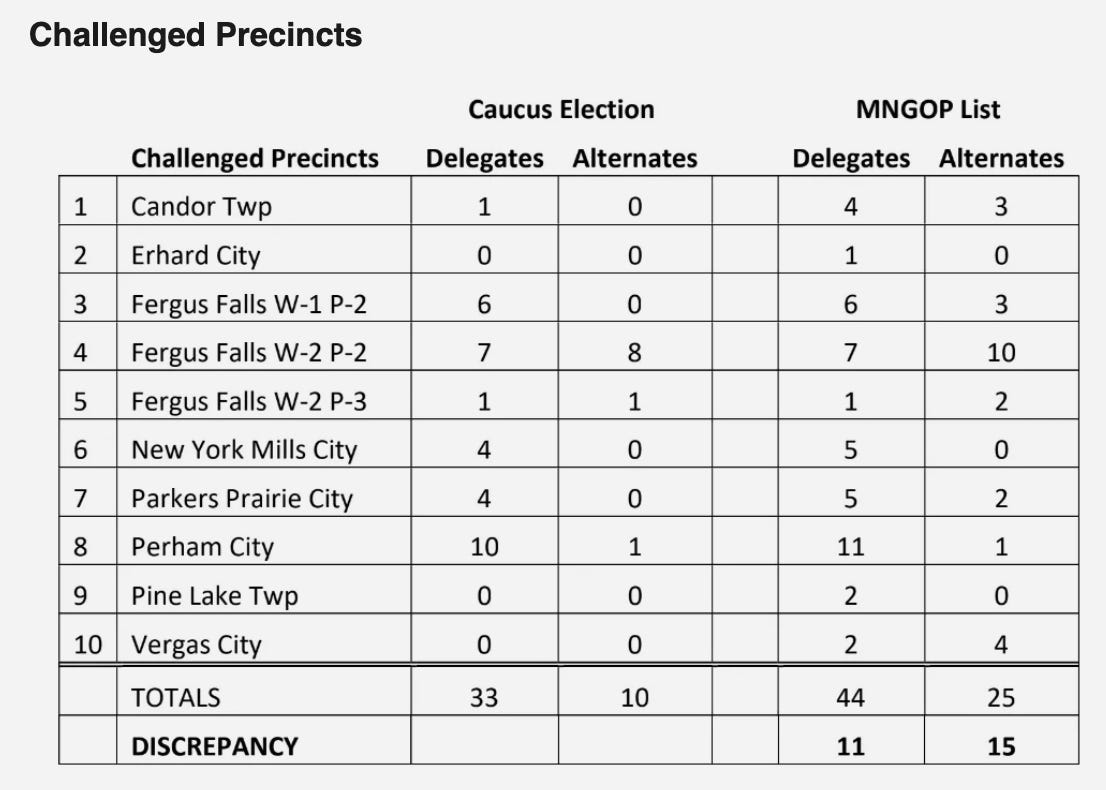
As described in Point #1, this fraud also likely affected the delegate election for state convention body in 2022 and the election for state central committee in 2023 when 35 duly elected delegates were deemed unfit to participate because they’d chosen not to vote for an illegitimate senate candidate installed through a fraudulent process. (They had instead voted for the write-in candidate standing on principle.)
22 04 18 People of Otter Tail response b7a0b65
Includes MNGOP response and commentary
22 04 18 People of Otter Tail response-b7a0b65.pdf
Otter Tail was not the only county in Minnesota with serious concerns raised. At the time of this writing, all cases remain unresolved. Instead of failing to address this, a mitigation or dispute committee could be created with the party to hear the case.
5.
Do most of the 1.5-2 million republican voters in the state of Minnesota know about the disenfranchised delegates in Otter Tail County?
Are there other cases of delegate list fraud outside of Otter Tail County?
Yes, see Morrison County. Are there other untold stories? What was the magnitude of this delegate list fraud?
Was the fraud minor or widespread? Was it enough to alter the outcome of an election? Yes, at least one senator should likely not be seated.
Once aware, is it the responsibility of delegates in the state convention to not only bring awareness to one another and the body but also to seek its resolution?
6.
The next precinct caucuses are scheduled for February 27, 2024.
Participation as measured by the governor straw poll increased more than 60% from 2018 to 2022.
It is expected that participation from 2020 to 2024 will also increase, especially with current events and increased awareness of how to participate in local politics and the recognition that it is vital for citizens to participate in their civic duty if they with to live free and peacefully in a constitutional republic.
Points #4, #5, and #6 describe a significant area where the party has violated state statute and is also out of compliance with its own constitution and rules—because once elected, precinct delegates cannot be removed (they are permanent under 202A.18) unless by a subsequent election, which has not yet occurred (precinct caucuses are scheduled for Feb 27, 2024).
This is important to establish because new reasonable legislation requires major political parties to also be in compliance with their own party constitution and rules.
So, although there are more areas where the Minnesota Republican Party is out of compliance with its own constitution and rules (revisited later in this post), we turn now to this pressing matter where the Party is out of compliance with new reasonable legislation which could see the Party lose its major party status.
7.
On May 13, 2023, a conference committee for HF1830 met and added, among other amendments, this critical one on major party status in 200.02 Subd. 7.
Major Party Status Amendment HF1830
"has complied with the party's constitution and rules... files... a certification ..."
Major_Party_Status_Amendment_HF1830.pdf
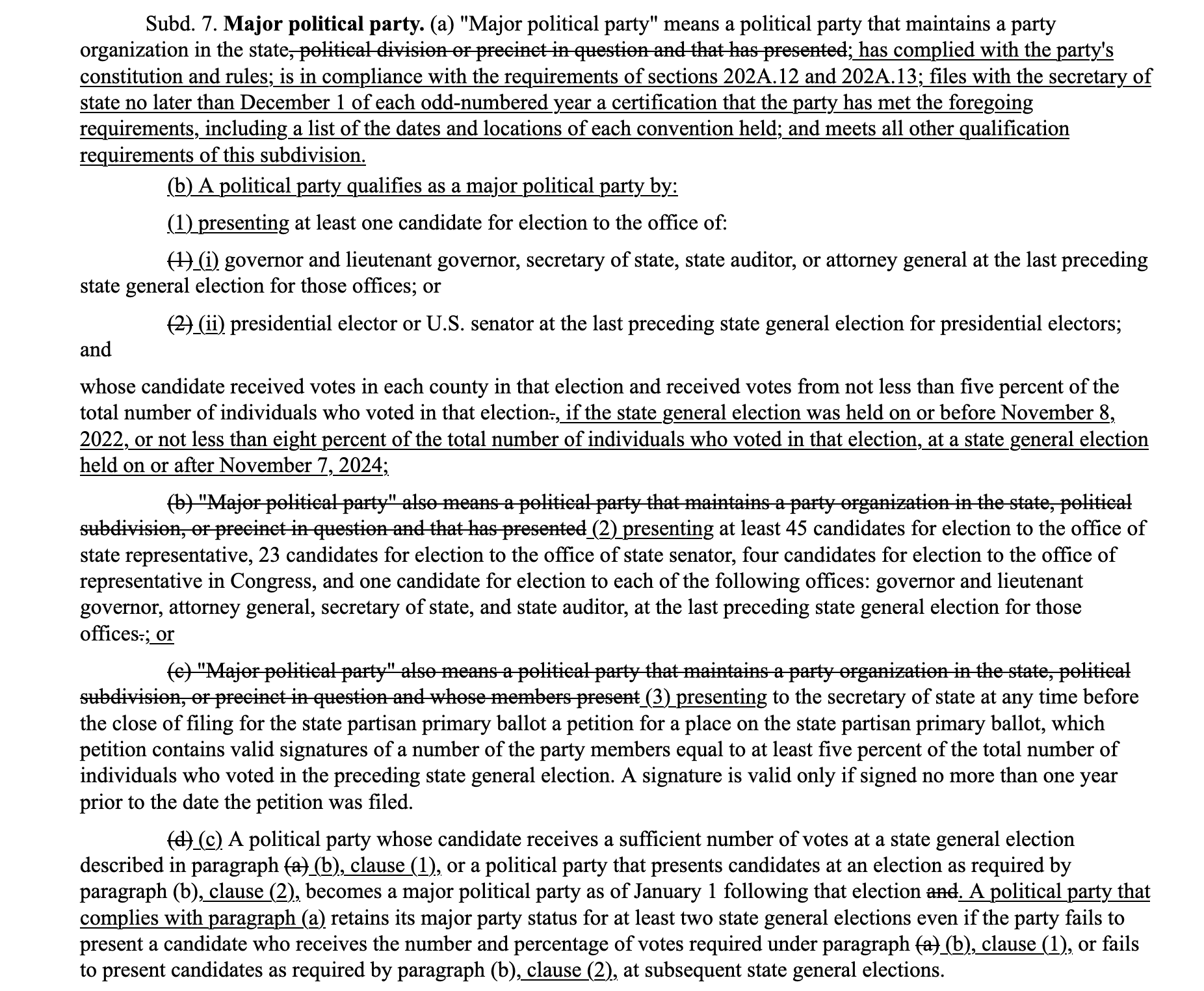

Representative Jim Nash, a Republican member of this committee, was asked whether he was either invited or attended this meeting, but is yet to reply.
8.
On May 24, 2023, HF1830 was signed into law by Governor Walz.
9.
In the August 12, 2023 meeting of the State Central Committee for the Republican Party of Minnesota, the Chair, David Hann, said he was not aware of the statutory changes made to caucus rules (important but separate from the matter at hand).
23 08 13 Jon Ross, Vice Chair of Polk County BPOU on SCC
Recap of Aug 12, 2023 State Central Committee meeting
This prompted one republican to read the multi-hundred-page omnibus bill, HF1830, again, which alerted this person in particular to amended Minnesota Statute 200.02, Subd. 7. (See above, Point #7.)
The result of reading the statute can be summarized as follows...
10.
The Party is now ACCOUNTABLE BY STATUTE to maintain
ABSOLUTE COMPLIANCE
With its CONSTITUTION and RULES
This Statutory language
ELIMINATES
any and ALL ILLUSIONS OF
A RIGHT of ANY SUB-UNIT
To Ignore the statutes, constitutions, laws & rules
BY WHICH THE PARTY IS BOUND.
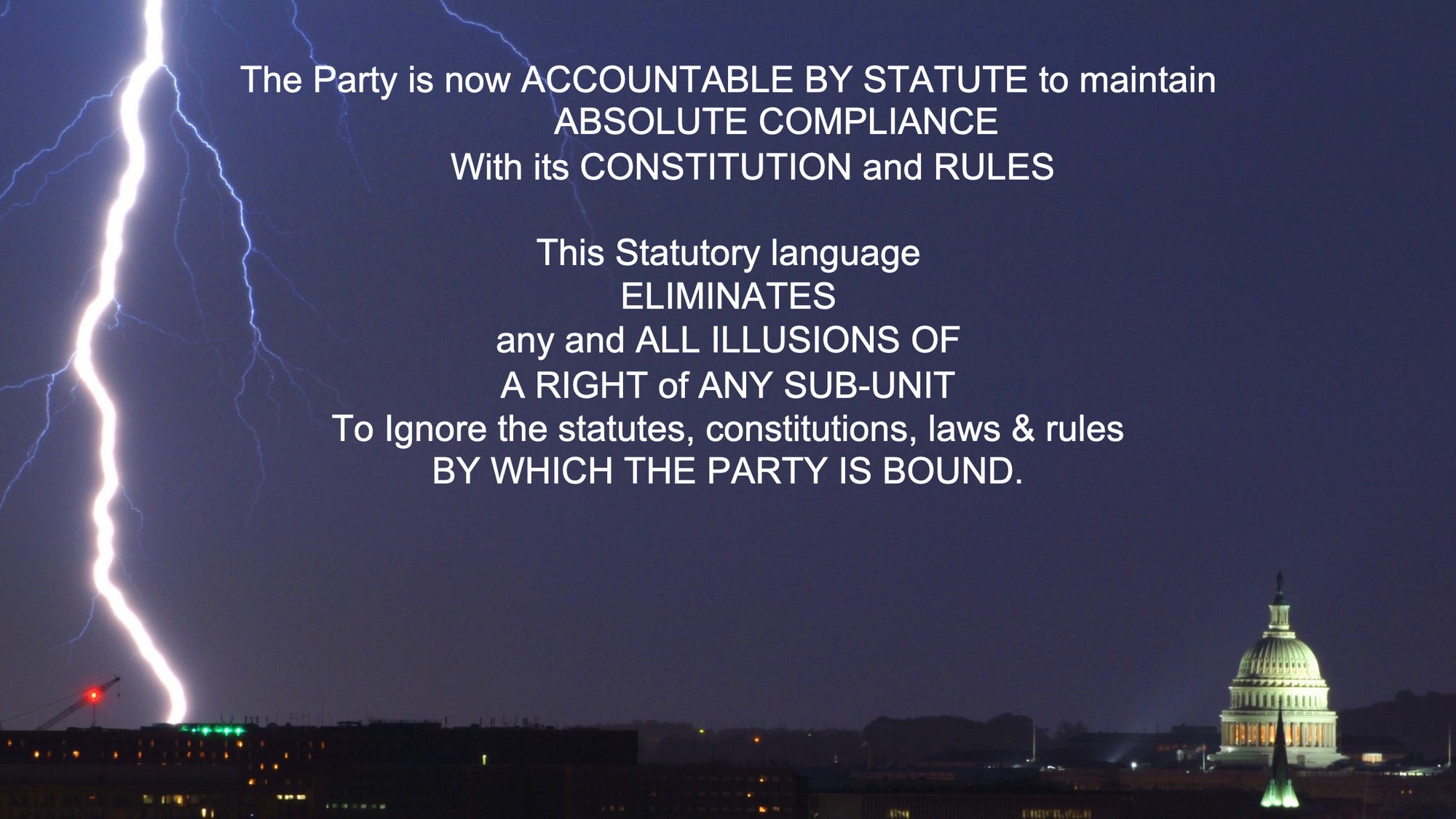
23 09 13 Updated MNGOP Compliance Plan 3474912
23 09 13 Updated MNGOP Compliance Plan-3474912.pdf
ALL bodies of the Party
MUST be in compliance with Statutes and Constitutional Provisions.
This compliance includes, but is not limited to:
Removals of Duly Elected DELEGATES
Removals of Duly Elected OFFICERS
The Rights of Delegates to Call a Meeting
The Rights of Delegates to be provided with all information necessary to provide proper oversight
The PARTY IS NOT IN COMPLIANCE
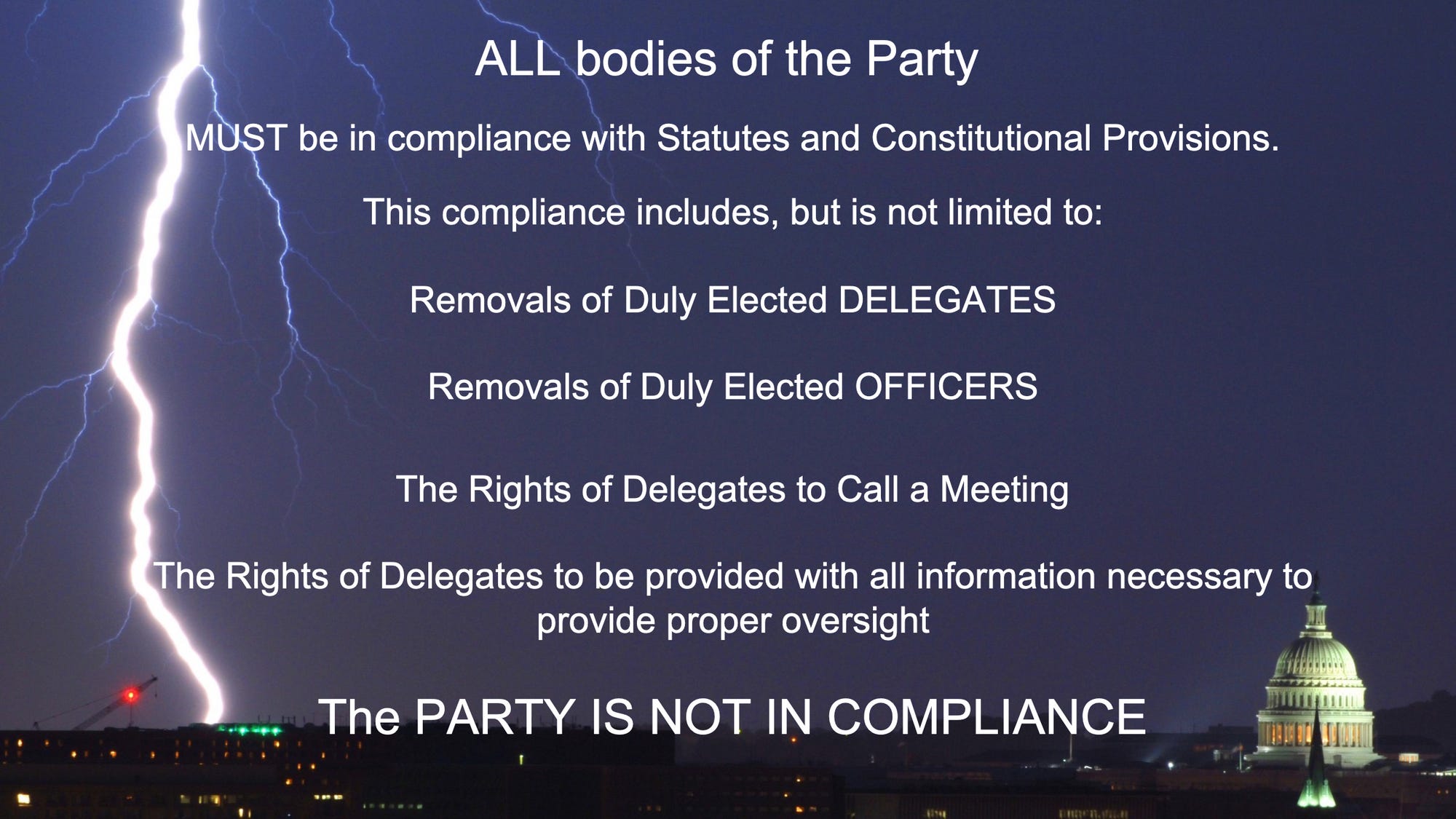
23 09 13 Updated MNGOP Compliance Plan 3474912
23 09 13 Updated MNGOP Compliance Plan-3474912.pdf
This accountability applies to the DFL Party as well. Ken Martin, Chair of the Minnesota Democratic-Farm-Labor Party was emailed for comment on this legislation, in particular on whether it should apply to the DFL and GOP, but is yet to reply.
Originally published on Project Minnesota HERE:
https://www.projectminnesota.com/a-major-party-with-major-fixable-problems/
This post is TOO LONG for email. To read all 36 points and 9 sets of questions in full, go HERE.
In coming days, an audio version of this post will be published.
Member discussion